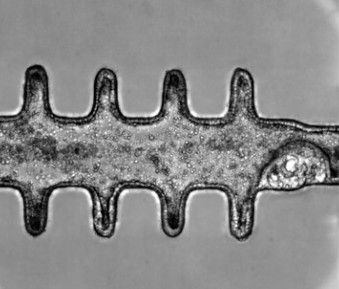In a significant breakthrough for cancer research, scientists have developed miniature colon tissues that can simulate the complex process of tumorigenesis outside the body with high fidelity. These mini-colons, created by combining microfabrication and tissue engineering techniques, give rise to tumors that closely resemble those found in vivo, bridging the gap between animal models and simplified cell culture methods.
The research, now published in Nature, was conducted by Luis Francisco Lorenzo Martín, Tania Hübscher, and other members of the group of Matthias Lütolf at EPFL, with input from the group of Freddy Radtke (EPFL) and colleagues at Roche’s Institute of Human Biology. The mini-colons are topobiologically complex, replicating both the physical structure and cellular diversity of colon tissue during healthy and diseased states.
Controlling Cancer Development with Light
One of the most innovative aspects of the mini-colons is the use of optogenetics to induce tumor development “at will” and in targeted areas. By integrating a blue-light-responsive system into the mini-colons, researchers were able to trigger oncogenic mutations in specific cell populations, mimicking the localized onset of colorectal cancer in the body.
Matthias Lütolf, the founding director of Roche’s new Institute of Human Biology, explains, “In essence, we used light to trigger tumorigenesis by turning on oncogenic driver mutations in a spatiotemporally controlled manner in healthy bioengineered colon epithelial organoids. This basically allows you to watch tumor formation in real-time and do very detailed analyses of a process that’s very difficult to study in a mouse.”
This optogenetic approach not only allows for more controlled and precise activation of oncogenes but also provides a powerful tool to study the dynamic processes of tumor development and cellular response to these mutations in real-time.
By manipulating genetic and environmental conditions, the researchers were able to replicate and observe a range of tumor behaviors in the mini-colons, even identifying key factors influencing cancer progression, such as the protein GPX2, which is associated with stem cell characteristics and tumor growth.
This groundbreaking research offers a potent new tool for exploring the underlying mechanisms of colorectal cancer and testing potential therapies, particularly when applied to human patient-derived tissues. The mini-colons’ ability to mimic tumor dynamics can reduce reliance on animal models, accelerating the discovery and development of effective treatments.


